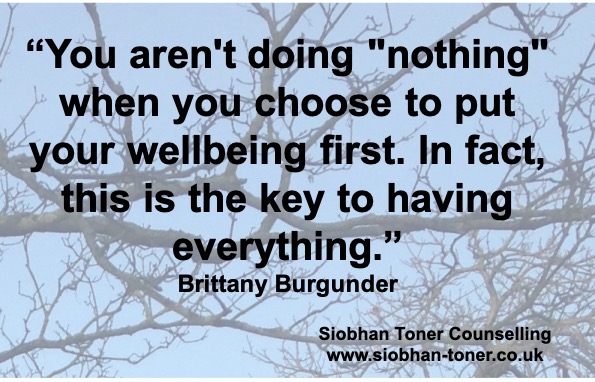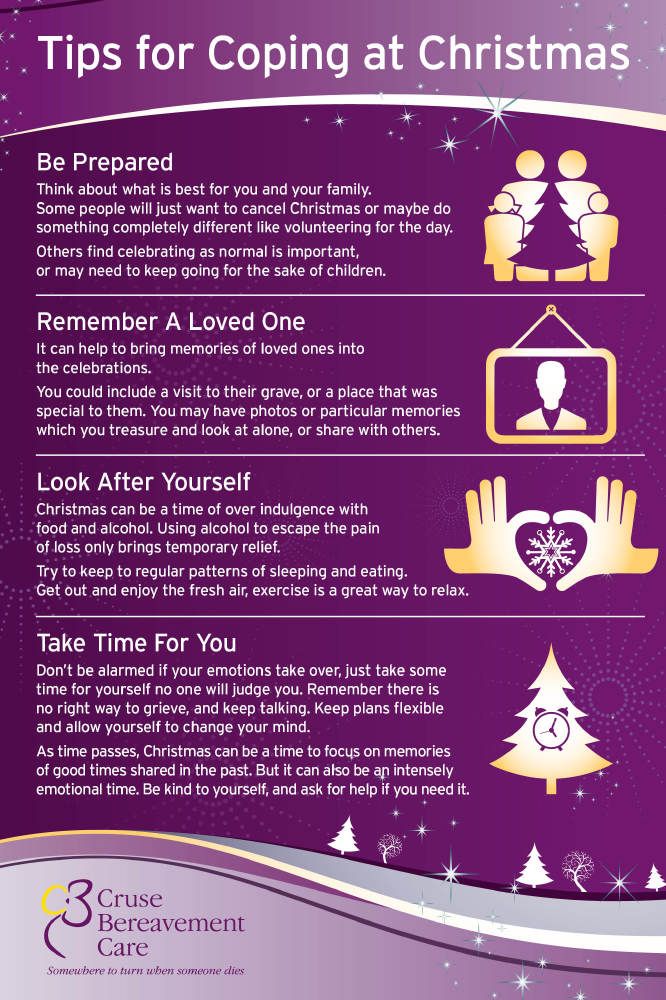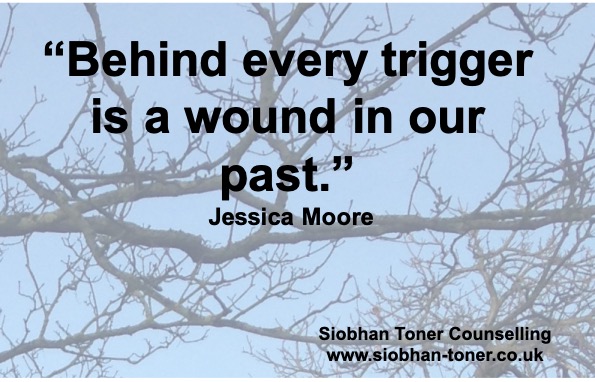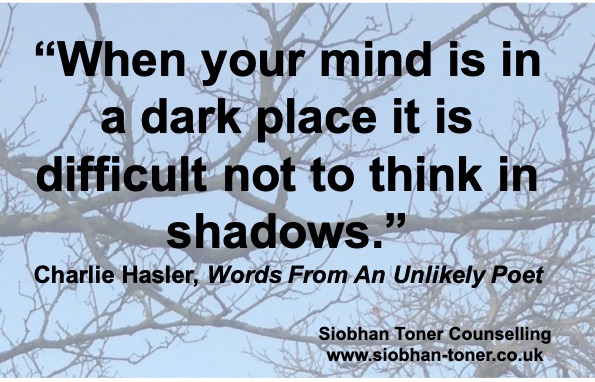
Thursday Thoughts


Counselling in London or online
Siobhan Toner offering individual one-to-one therapy in London or online

There is a lot of celebrating going on around us at this time of year, but what if you aren’t part of that?
There are many reasons that you may be finding the festivities hard to cope with. One of those is bereavement, either a recent one or one that happened at this time of year in the past. Cruse have put together the graphic at the bottom of the page which you may find useful.
But there are other reasons; you may be suffering from an illness that makes it hard to feel like celebrating. This could be a mental health illness or one that gives you physical pain.
You might be estranged from family members and all the talk of family gatherings make it hard for you to join in the happiness because of your own emotions.
Your children may not be spending Christmas with you as they are with their other parent or your family is in another country.
You may be lonely and feel you don’t have anyone to spend the holiday with.
There are always organisations open to offer you crisis help if you need it, the most well know is the Samaritans who are there to talk if you need it.
Maybe what you need is to plan to change something longer term and are thinking about therapy. This might be the time to initiate that, please feel free to contact me if that is the case.
To all those people who are finding it tough this year I hope you find some solace and find some peace despite what is going on for you.


I see more online about family estrangements and separated families. While its always a risk going into comment sections of social media I also find it interested how people view these situations.
Now, like everyone else apart from those directly involved, I don’t know the full story of what is being posted. I do know the stories of many people (including my own) of those who have chosen to cease contact with family members. It’s never an easy choice and it usually comes after years or decades of toxic or abusive relationships. Within those relationships, all parties may have displayed behaviour they are not proud of; they may have tried to repair things unsuccessfully; they may have papered over the cracks again and again.
Each story will be different. What isn’t helpful is other people who are on the outside passing judgments. These judgements are at best unwelcome and also potentially damaging and abusive.
I was reminded recently of the request by many school for parents not to take photos at school plays because they may contain images of other children who are at risk. With these being put on social media, then they can be traced must easier. I am sure there are people who object to this as their experiences have meant that haven’t had to consider these things. It’s the same with judging separated families.
Without the experiences then it may not be obvious why people make the choices they make. Instead of judging or worse interfering in a way that can put people at risk, try and ask yourself what would lead someone to make a choice like that?
If you haven’t had a family like this, then please recognise what a privilege that is for you. A secure loving family of one of the greatest advantages anyone can have. The evidence on adverse childhood experiences which I have written about before show just what an advantage this gives to you.
If you have made a choice to remove contact with a family member, then I am sorry you have needed to and I wish you well. It can seem so much harder in December dealing with these issues as family celebrations are promoted to us everywhere.

I’ve recently revisited a post I wrote many years ago on privilege, adverse childhood experiences to update the links in it.
It made me sad to think about it as it as I realised all the research and statistics were from before we had ever heard of Covid. Surely now in the future living through a pandemic will count as an adverse childhood experience on its own, which means the rate of those with the higher numbers that lead to more difficult longer term outcomes will increase substantially. That doesn’t count those children who have experience loss of loved ones or significant separations due to hospitalisations.
All those who have been children over the last 5 years have a much higher risk of mental and physical health conditions in adulthood and shorter life expectancy. I was aware of how hard it has been but revisiting the older research has really brought it home to me.
There are things that can done to help mitigate the risk, both within families and communities but the most significant health is going to be systematic which is driven by governments. The CDC page has some details of the types of things that can help . I’ve been looking for and updates on information from the UK since Covid and haven’t been able to find it. I think we all are aware that support for early years and funding has been drastically reduced since 2008/2009. Without investment back into these areas there is only so much individuals can do.
I really like this video on how children’s brains develop and the impact of toxic stress.
I mentioned in my last post how intergenerational trauma can be passed on through environmental factors. This video show how important the environment we are raised in is to help us and our brains develop. However, if the parents were also raised in environments that weren’t supportive then you can see how they wouldn’t have the skills to change the patterns.
Many of my clients both young people and adults have come from childhoods where things weren’t as good as they could have been. Its never to late to work on the damage caused, it might be harder the longer things have gone on for but change can still happen.
Why do so many people struggle with seeing their family en masse? It’s most noticeable during holiday events or special occasions one of which is Christmas which isn’t far away.
Gathering together members of the family gives a space for all the old patterns of behaviour to be played out again. All the unresolved issues are brought back to the surface and we witness the intergenerational trauma.
Siblings may revert to their childhood roles that their parents allocated for them, even if that was decades ago. Their parents fail to see the adults they have become and treat them as they perceived them in the past.
Grandchildren see their own parents behaving or being treated very differently and this influences how they relate to their parents. Not just during the time frame they are all together but moving onward.
There are two strands for us to consider when thinking about Intergenerational trauma. One generation that has not been able to process their trauma in a healthy way can pass it on to the next generation through their behaviour and causing more trauma to them and they repeating the cycle to the next. It can flow on for many generations causing more and more damage and dysfunction.
However, there is also research being done on how this affects our genes. This is called Epigenetic’s and is the study of how environments and events can affect how our bodies read and responds to our DNA without changing the DNA sequence itself. The research is exploring if traumatic events in one generation get passed down through the generations that come other in how we respond to certain triggers and stimuli.
This article gives more details of what this means and the types of research that is being undertaken.
Whether its just behaviour or epigenetic’s also plays a part, there is no doubt that breaking the cycle of intergeneration trauma is hard but necessary work.
Healing is a process that starts with acknowledging that there is something not right. What it ends up as is going to be different for everyone and its not always helpful to have an idea or compare to others as this can lead to a sense of failure rather than achievement and self-compassion.
Before this holiday season starts, are you already dreading what may happens and being with your family for an extended period of time? Is this the time to acknowledge that something isn’t right?
I first published this post in November 2016. I feel it is still very relevant now in November 2024.
——————————————————————————————————–
This morning the news and social media shows me so much anxiety about the changes to come over the next few months.
What is it about change and this change in particular that is causing this level of concern?
Change is always a step into the unknown. It takes us out of the comfort of the familiar and predicable. But even that is an illusion as nothing is truly fixed. The world we live in is fluid and changes with every breathe but to acknowledge that can be terrifying. How could we function if we wondered what would happen every second? How could we achieve anything?
So we ground ourselves in the familiar, the routine, the predicable and it comforts us and makes us feel safe. For those already prone to suffering from anxiety, this isn’t easy anyway and it can be exhausting.
And then something as big as todays news happens. There is something about it that shows a level of change that really makes it hard to hide in the comfort zone. It was the same with the result of the Brexit referendum that many people are still struggling with in the UK.
I am trying to work out what the real anxiety is, is it really to do with the change that is coming as politicians come and go yet this feels very different.
I don’t have an answer but some of the things that are coming to mind are around vulnerability.
One person we will never meet on the other side of the world has the potential to have a huge impact on each of our lives. That is a scary thought, that we are so vulnerable. How can we be in control of our own destinies if that is the case?
If that person has very different values to us, what is going to happen? Do we have the resources to stand up for our values in the face of that sort of opposition? Where would our safety and security be then?
How do we live with people with different values to us? If the power in the world is held by white, straight, Christian males who appear to promote values that show anyone who isn’t the same as them becomes the “other” and the “other” is of less value what happens to those of us who don’t fit the categories? How many others in the world around us hold those views. How safe is that world?
So we feel vulnerable. And that leaves us anxious.
And today a lot of people are extremely anxious.
I’ve been thinking a lot about how the current health crisis is affecting or will impact all our mental health.
I’ve found myself thinking about it more and more and worrying about what I should or shouldn’t do. I’ve also notice I’ve been having dreams that I am a lot more anxious during and after when I wake up.
It is bound to have an impact but we can all do things to help support our mental wellbeing. This article has some useful tips.
Putting some of these into practice will take time and persistence, however, the benefits may be very valuable.
Self care may not always be easy, but I wish you well with it.